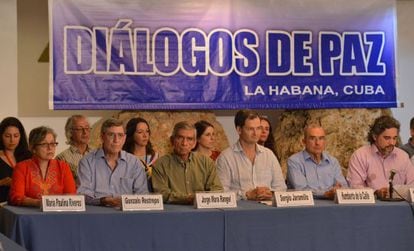Colombia and the FARC agree to create an impartial Truth Commission
Testimonies collected by the proposed 11-member panel cannot be used for prosecutions

In a far-reaching move, the Colombian government and members of the Revolutionary Armed Forces of Colombia (FARC) on Thursday announced the creation of an independent and impartial Truth Commission to investigate abuses and crimes committed by both sides during the now 53-year-old conflict.
The announcement made in Havana, where government and FARC representatives have been holding peace talks for nearly three years, is a major step aimed at unblocking a crucial issue concerning war victims that had been stalling discussions over the past few months.
The talks were put in jeopardy when the FARC said it would no longer respect its unilateral ceasefire
The entire talks were also put in jeopardy last month when the FARC said that it would no longer respect its five-month-old unilateral ceasefire after President Juan Manuel Santos ordered air strikes on guerrilla camps in retaliation for an insurgent attack in which 10 soldiers were killed.
Many Colombians have questioned how much power the Truth Commission will have. According to a joint statement, the panel will hear from all sides of the conflict, especially the victims.
Cuba and Norway, the guarantors of the peace process, said none of the evidence received by the commission would be able to be used to prosecute anyone in the courts and the panel would protect all witnesses called to testify.
On Wednesday, the FARC said in its own statement that it would not cast a vote “in favor of the Colombian judicial system or agree to simple promises without guarantees from the corrupt institutions.”
“We did not come to Havana to submit ourselves,” the declaration read.
The Truth Commission would be empaneled once a final peace accord is signed and will function for three years.
The Truth Commission would be empaneled for three years once a final peace accord is signed
The panel will be made up of 11 members chosen by a nine-person committee. The government and FARC will select six of the committee members, while three others will be appointed by organizations or groups that will be chosen at the negotiating table in Havana. The chairman will be Colombian, while no more than three members can be foreigners.
“While it is an improvement – because it unblocks negotiations – it does not accelerate them to the point where they will be able to begin to tackle the issue of ending the conflict,” said Jorge Restrepo, director of the Conflict Analysis Resource Center (CERAC).
According to the statement, the commission will have three main objectives. One will be to clarify what occurred during the conflict and “provide a comprehensive explanation of its complexity while promoting understanding.”
Other goals will be “to promote and contribute to recognizing the victims as citizens who saw their rights violated,” and to push for peaceful coexistence in territories.
After the joint news conference, FARC leader Iván Márquez demanded the “opening of all archives that demonstrate the existence of systematic violations” – which is to say, that the government grant access to documents related to possible state crimes.
Reading from a statement, Márquez charged that the Colombian government wants to single out the FARC and hold it criminally responsible for the conflict.
“They want to turn this peace process into a criminal proceeding against the FARC,” he said.










































